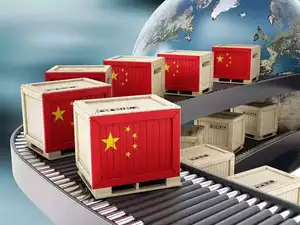
China affirms rare-earth export controls align with international practices
BEIJING : China’s export control measures are consistent with universal practices, and such measures are non-discriminatory and not targeted at any particular country, a spokesperson of China’s Foreign Ministry said on Thursday.
Lin Jian, the spokesperson of the Foreign Ministry, made the remarks in response to a media question for comment on a report claiming that due to China’s export controls on rare earths, Japanese automaker Suzuki has suspended production of its main small cars in Japan because of delays in procuring parts, which was reportedly the first case in Japan.
Also on Thursday, in response to a question over some foreign companies’ claims that the approval process of rare-earth export permits is relatively slow and their business may face a potential halt of output, He Yongqian, a spokesperson of China’s Ministry of Commerce (MOFCOM), said at the regular press conference that items related to rare earths have dual civilian and military applications, and the Chinese government’s move to strengthen export controls on rare-earth materials is in line with international practices.
The Chinese government reviews applications for export licenses for dual-use items in accordance with laws and regulations, He said, noting that China will approve applications that meet the requirements to promote convenient and compliant trade.
“China’s rare-earth export management system is a legitimate and law-based effort to continuously improve our export control framework and reduce associated risks… This is a common international practice,” Zhou Mi, a senior research fellow at the Chinese Academy of International Trade and Economic Cooperation, told the Global Times on Thursday.
“We are not banning rare-earth exports; rather, we are refining the management procedures,” Zhou further noted.
China released new regulations on the export control of dual-use items, taking effect on December 1, 2024. The rules aim to maintain international peace and balance high-quality development with high-level security.
The Ministry of Justice and the MOFCOM previously stated that the regulations would not obstruct normal international scientific exchanges or economic cooperation. They stressed that export control is not an export ban, emphasizing China’s intent to maintain a stable and predictable regulatory environment for trade of these items.
While addressing questions regarding China’s export control on dual-use items at a press conference on May 29, He said that it is common international practice to impose export controls on items with clear military-civilian dual-use characteristics. As a responsible country, China’s implementation of export controls on such items reflects its consistent stance on upholding world peace and regional stability, the spokesperson said.
Also, at the same press conference on Thursday, when asked to comment on the recent US suspension of ethane exports to China, along with other retaliatory measures in response to China’s rare-earth export controls, the MOFCOM spokesperson said that since the release of the Joint Statement on China-US Economic and Trade Meeting in Geneva on May 12, China has acted responsibly, diligently fulfilling its commitments and actively working to uphold the consensus reached in Geneva. In contrast, the US has taken a series of restrictive actions against China.
These actions, He said, seriously undermine the consensus reached during the talks and infringe upon China’s legitimate rights and interests.
“China is deeply dissatisfied with and firmly opposes these measures,” He stated, urging the US to immediately cease such actions. “If the US continues to harm China’s interests, China will take resolute and effective measures to safeguard its legitimate rights.”
“The US decision to halt ethane exports to China is a targeted and discriminatory move. It’s not about building a reasonable or lawful system – it’s about using exports as a tool of hegemony, undermining international trade and mutual trust,” Zhou said, noting that this is a clear example of the US taking unilateral, discriminatory action, and in nature it is entirely different from China’s export management of rare earths.
The US has introduced retaliatory actions without sufficient justification and arbitrarily imposed restrictions, acting in a unilateral manner, Li Yong, a senior research fellow at the China Association of International Trade, told the Global Times on Thursday.
“Our recent engagements in Geneva sent a positive signal for China-U.S. economic and trade relations, creating a good starting point, but the US should meet China halfway,” Li said.
Source : Global Times

